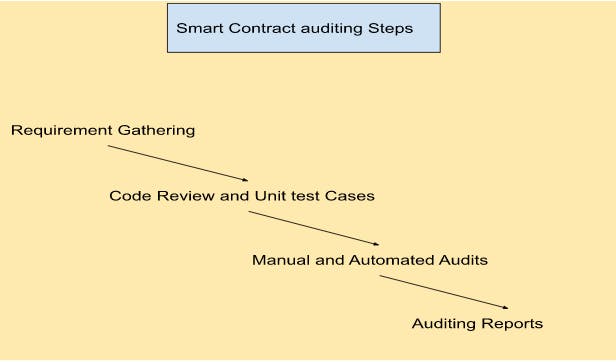Perform a smart contract audit for your project
Secure your Blockchain Projects with Smart contract Auditing Solutions
With the world moving toward blockchain technology, the need to develop a quintessential smart contract has risen. Smart contracts are prone to vulnerabilities, no matter how secure these Web3.0 solutions are. From the infamous DAO hack to Defi heists, crypto-crimes have regularly been the part of breaking news amongst Web3.0 enthusiasts. This calls for a need to audit smart contracts, requiring smart contract consulting to secure them from being hacked. This article will discuss the smart contract auditing solution and the steps involved in the auditing process. Table of Contents What is smart contract Auditing? How to perform Smart contract auditing? Manual Audit v/s Automated Audit Steps Involved in Smart contract auditing? Smart contract analyses for Gas Optimization How much does a smart contract audit cost? What is the cumulative period required for auditing a smart contract? Sum Up
Let's Get Started!
What is Smart-contract Auditing? Smart-Contract auditing involves precise analyses of a source code for vulnerabilities and verifying if it follows the pre-determined conditions and behaves as intended by the developer. Third-party auditing acts as an additional layer of protection for a smart contract and makes them performance-optimized. Following is a list of vulnerabilities that are typically observed in a smart contract.
- Re-Entrancy
- Arithmetic Over/Under Flows
- Unexpected Ether
- Delegate call
- Entropy Illusion
- External Contract
- Referencing
- Short Address/Parameter Attack
- Unchecked CALL Return Values
- Denial Of Service (DOS)
- Block Timestamp Manipulation, among others…
How to perform Smart contract auditing? Probably, a robust security stature of a smart contract is the primary reason behind the adoption of this technology. Although bugs and vulnerabilities are still a part of these programs, calling for an external audit solution.
A smart contract auditing can be broadly categorized in two ways Manual Auditing Automated Auditing
Let us have a look at both these auditing solutions in a row.
Manual Auditing As the name suggests, it involves manually screening the source code by a third-party smart contract audit consulting entity. A manual code review is probably the best way to identify the security loopholes. It usually involves a team of auditors scrutinizing the smart code line-by-line for a number of vulnerabilities and issues like Re-entracy, leakage of funds, gas optimization, and more.
Automated Auditing Automatic code analysis deploys software tools specifically designed for a particular set of blockchain protocols. Automated code analysis also permits sophisticated penetration testing that helps find vulnerabilities quickly. What are the steps involved in smart contract auditing? Smart contract auditing is an extensive process involving manual and automated auditing techniques.
Following are the steps involved in smart contract auditing.

1. Requirement Gathering
Primarily involving data collection, including developer's code, white paper, and other documents necessary to analyze the intended business behavior. It helps determine the roadmap required for the complete audit process.
2. Code Review and Unit test cases Security auditors perform an initial review of the code. Also, they run unit test cases provided by the developers, which assist in verifying if the smart contract is following its intended behavior.
3. Manual and automated Auditing Techniques A manual audit involves thoroughly verifying sets of code line-by-line and apprehending the vulnerabilities associated with it. On the other hand, automated techniques deploy solutions like fuzz testing and pentesting using smart contract auditing tools like Slither, echidna, scribble, and manticore, among others, based on the smart contract's language.
- Auditing Reports Usually, it is imperative to present audit reports at two stages of the audit process, one, after reviewing through manual and automated techniques, and second, after code refactoring to prevent any remaining vulnerabilities from resurfacing.
Smart contract analyses for Gas Optimization
Gas price is the fees users charge for executing their transaction on a block. Tweaking your smart contracts for gas optimization is essential to reduce transaction costs. It is possible to build a reasonably accurate estimation of the gas cost associated with a particular smart contract. Executing test runs or one or two transactions can provide a fair understanding of actual gas utilization. Hence, optimizing smart contracts for gas fees helps maintain the overall cost of your smart projects.
How much does a smart contract audit cost?
Auditing a smart contract can be a costly affair. However, it depends on the type, code complexity, security concerns of the project involved, and off-course security consulting company that you are hiring to perform security audits. Also, it depends on the level of documentation provided by the developer to understand the business logic implemented. On average, it costs around $(5000–15000).
What is the cumulative period required for auditing a smart contract?
The duration of a smart contract audit primarily depends on the project expanse and the complexity involved. For simple tokens like ERC 20, ERC 721, and more, auditing requires a few days extending up to a week. But, for more complex projects like DAO, Defi, NFTs, and DApps containing intricate tokenomics, auditing may take up to a few months. Also, the duration depends on the techniques and tools used by the auditors. A manual audit is a comprehensive and tedious task, while codes are usually test-run for vulnerabilities using an automated tool. Usually, it involves integrating both techniques to make your smart contracts free from vulnerabilities.
Sum Up
Today, smart contracts are literally everywhere. Once deployed on a blockchain, they are visible to all the users of the specified blockchain and their vulnerabilities. With the growing adoption of blockchain technology, securing these self-executing sets of code becomes mandatory, making them unsusceptible to security loopholes. So, to prevent such a situation, include auditing as a part of your smart project and make your blockchain journey a hack-free experience.